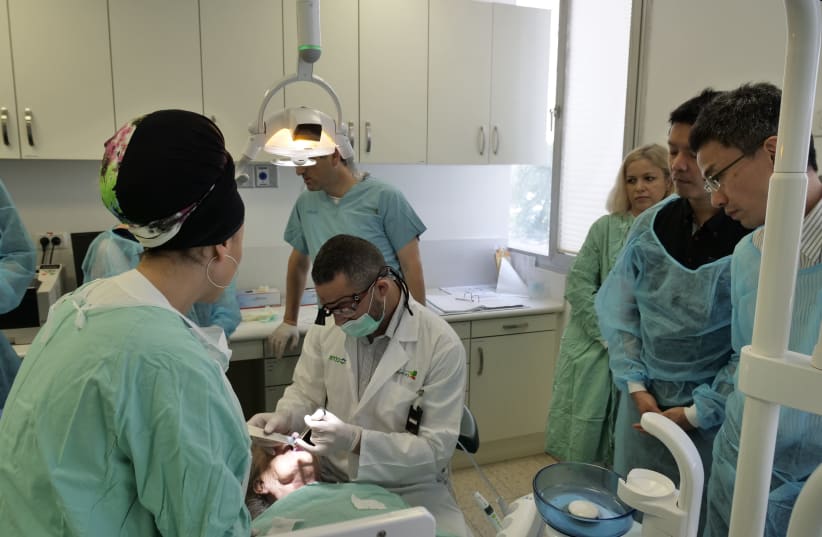While a vaccine against the novel coronavirus is expected to take upward of a year to develop and test, other treatments for the
deadly threat could be just a few months away, health experts say.
More than 410,000 people have been diagnosed with COVID-19 and over 18,000 have died. Several countries have gone into lockdown as the number of those infected by the highly contagious disease continues to rapidly rise.
Scientists around the world are racing to develop treatments and vaccines, which will have to undergo several rounds of testing and clinical trials before moving on to mass production.
“More than 20 vaccines are in development globally, and several therapeutics are in clinical trials,” an official for the World Health Organization told The Media Line. “No treatment and vaccine exist yet, but researchers around the world [are working] hard for it.”
While a vaccine will likely take between 12 and 18 months to be proven safe and effective and be produced for mass use, other effective treatments could emerge much sooner.
Prof. Peter Jay Hotez, a prominent virologist and the dean of the Baylor College of Medicine’s National School of Tropical Medicine in Houston, Texas, told The Media Line that the earliest treatment that could work against COVID-19 would be a convalescent serum antibody therapy, in which the antibodies of a person who has recovered from the virus are injected into a sick patient.
In a study published in The Journal of Infectious Diseases in 2014, researchers demonstrated how convalescent blood plasma might be effective to significantly reduce mortality rates, if administered to those who have contracted severe acute respiratory
infections (SARIs) soon after their symptoms first appear.
According to Hotez, the next treatment to emerge after this will most likely be “repurposed existing antiviral drugs in a few weeks
or months, then new chemical drugs within a year, and a vaccine in one to three years.”
Interestingly, Hotez and his team of scientists already developed a coronavirus vaccine years ago, following the 2002-2004 SARS outbreak, which spread out of China and ended up killing more than 770 people worldwide. However, when the vaccine reached the stage of human testing in 2016, he was unable to secure further funding, and the trials were never concluded.
“At the time we manufactured it, people had lost interest in coronavirus epidemics and pandemics,” Hotez said, adding that researchers are now working to repurpose that vaccine for COVID-19.
Coronaviruses are a group of related viruses that cause diseases including some cases of the common cold, and not just SARS and COVID-19.
Dr. Rivka Abulafia-Lapid, a senior lecturer on virology at the Hebrew University of Jerusalem, agrees with Hotez that antiviral treatments will likely become available within six months and much sooner than a vaccine, barring any unforeseen developments.
“Israel already has 11 different drugs for trial [on COVID-19 patients]... so I would say that the first thing to come out will be a
drug that will be commonly agreed upon by the world’s scientists and the FDA [the US Food and Drug Administration], followed by a vaccine,” Abulafia-Lapid told The Media Line. “In a couple of months, they will come out with a future treatment or maybe a cocktail of drugs.”
Abulafia-Lapid, who for 25 years headed a research team in Israel dedicated to developing a viable vaccine against HIV and other autoimmune diseases, said that any vaccine would have to undergo a lengthy testing period involving several phases of clinical trials.
Among the current drugs being looked at as anti-coronavirus candidates in the meantime, she points to California-based biotech company Gilead Sciences’ experimental antiviral drug remdesivir −originally tested on humans with the Ebola virus − as being a
front-runner in terms of showing promise. Remdesivir is already being used in several coronavirus-linked clinical trials.
Israeli pharmaceutical giant Teva, meanwhile, announced last week that it would donate more than six million doses of hydroxychloroquine sulfate pills to hospitals across the United States for further research. The medicine,which is typically used to treat malaria, is being investigated as a candidate to counter COVID-19.
Regarding the possibility of a convalescent antibody serum treatment, which Hotez says could already be administered to seriously ill
patients, Abulafia-Lapid indicated that while such a treatment could save lives, significant challenges remained with scaling-up this method for thousands of people.
Ultimately, however, she is “very optimistic” that the world is six months away from an effective treatment.
“In the future, we will have to come out every year with a new [COVID-19] vaccine because it mutates like influenza,” Abulafia-Lapid
said, adding that because the virus is so new, the human immune system is currently defenseless against it. “You really need to teach the body [how to defend against it],” she said.
